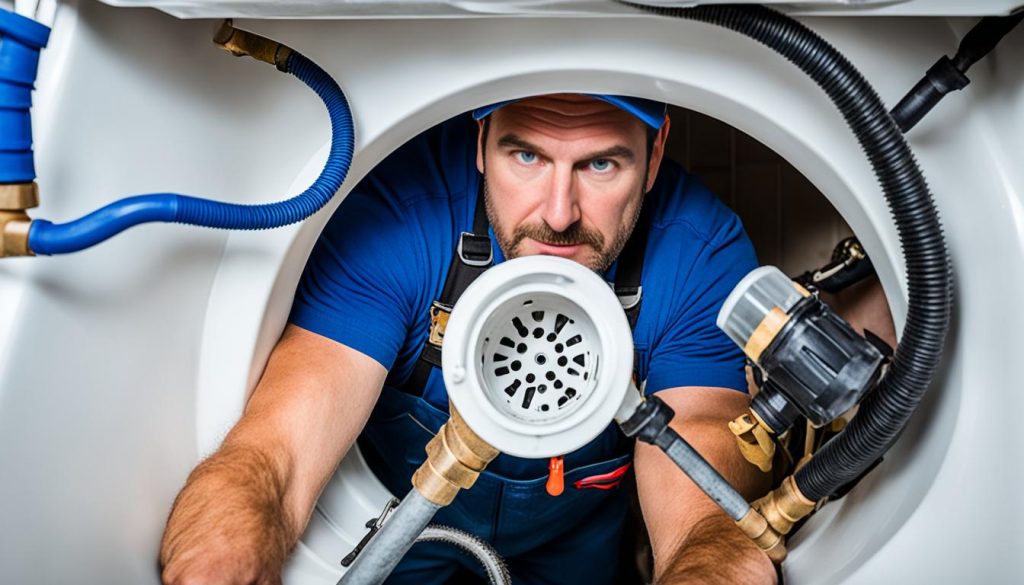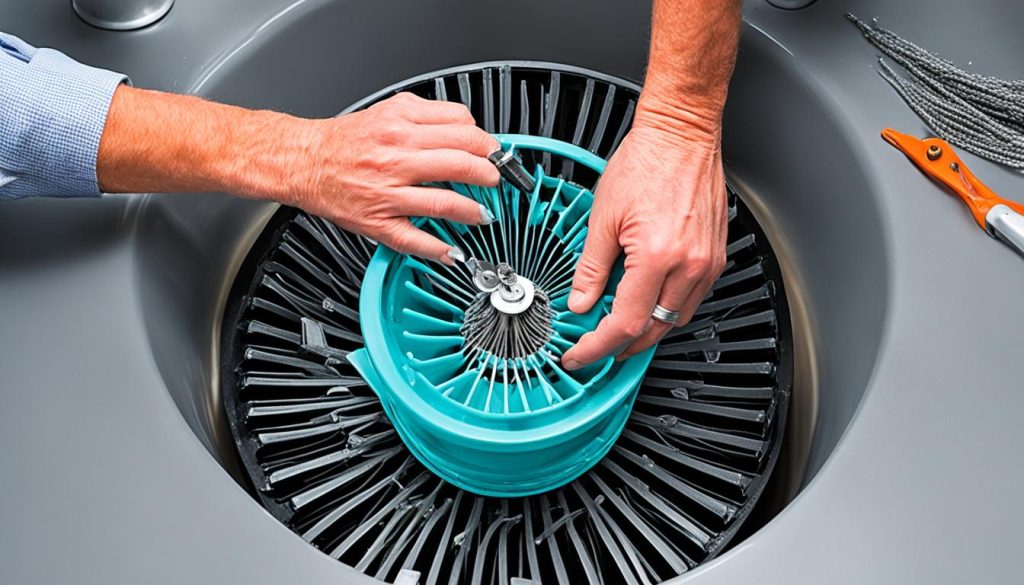Conquering Stoppage Plumbing Issues in Canada
Did you know that clogged pipes and sewer line blockages are responsible for more than half of the emergency calls received by professional plumbers in Canada? Stoppage plumbing issues can be a major headache, causing disruptions to your daily life and potentially costly repairs.
In this article, we’ll explore the common reasons for stoppage plumbing, effective solutions, and preventive measures to keep your plumbing system running smoothly. Whether you’re a homeowner or a business owner in Canada, understanding how to conquer stoppage plumbing problems is essential to maintaining the functionality of your property.
Key Takeaways:
- Stoppage plumbing issues account for more than half of emergency calls to professional plumbers in Canada.
- Understanding the common causes of clogged pipes and sewer line blockages is crucial for effective solutions.
- DIY fixes can address minor clogs, but professional plumbing services may be necessary for more complex issues.
- Preventive measures such as regular maintenance and the use of drain protection products can help avoid future clogs.
- Investing in professional plumbing services can save you time, money, and further damage to your plumbing system.
How to Identify a Clogged Drain
Clogged drains can cause a great deal of inconvenience and frustration. It’s important to be able to recognize the signs of a clogged drain so that you can take action before the problem worsens. Here are some common indicators to look out for:
- Slow drainage: If water takes longer than usual to drain from your sink, shower, or bathtub, it could indicate a clog in the pipes.
- Gurgling noises: Unusual gurgling sounds coming from your drains when water is flowing can be a sign of a clog.
- Poor water pressure: If you’re experiencing reduced water pressure from your faucets, it could be due to a clogged drain.
- Foul odor: A persistent foul smell emanating from your drains is often a clear indication of a clog.
- Water or sewage backing up: If water or sewage is backing up into sinks or tubs, it’s a definite sign of a clogged drain.
If you notice any of these signs, it’s important to address the issue promptly to prevent further damage to your plumbing system. Ignoring a clogged drain can lead to more serious and costly problems down the line.
To give you a better idea of how to identify a clogged drain, here’s a comprehensive table summarizing the key signs:
| Sign | Description |
|---|---|
| Slow drainage | Water takes a long time to drain from sinks, showers, or bathtubs. |
| Gurgling noises | Unusual gurgling sounds coming from drains when water is flowing. |
| Poor water pressure | Reduced water flow from faucets. |
| Foul odor | Persistent unpleasant smell coming from drains. |
| Water or sewage backing up | Water or sewage reappears in sinks or tubs after draining. |
Common Causes of Bathtub Drain Clogs
Bathtub drains can become clogged due to various reasons. One of the most common causes is hair. As you take a bath, hair naturally sheds and can easily accumulate in your pipes, eventually leading to a blockage. Another culprit is soap scum, which forms a filmy substance that can trap hair and other debris. Bath bombs containing non-dissolvable additives like cornstarch can leave residue in the pipes, causing blockages. Similarly, cosmetic products like eye shadow, hair gel, and moisturizers can also contribute to clogs. Damaged pipes, such as dented or corroded pipes, can further restrict water flow, leading to drainage issues.
https://www.youtube.com/watch?v=JWZklniOo_4
DIY Fixes for a Clogged Bathtub Drain
If you’re dealing with a clogged bathtub drain, there are several DIY fixes you can try before calling a professional plumber. By taking matters into your own hands, you may be able to clear the blockage and restore proper drainage. Here are some effective methods to consider:
1. Remove Visible Blockages
Start by putting on rubber gloves and using a container to scoop out any standing water. This will allow you to access the drain and remove any visible blockages, such as hair or debris. Ensure that you dispose of the collected material properly.
2. Flush with Boiling Water
After removing visible blockages, you can try flushing the drain with boiling water. Boiling water can help melt away grease and clear soap residue that may be contributing to the clog. Carefully pour the boiling water down the drain and see if it improves the flow.
3. Baking Soda and Vinegar Solution
If the clog persists, you can create a homemade solution using baking soda and vinegar. Start by pouring half a cup of baking soda down the drain, followed by half a cup of vinegar. Cover the drain with a cloth or stopper to trap the fizzing action. Let it sit for about 30 minutes, then flush the drain with hot water.
4. Plunge with a Plunger
If other methods haven’t worked, you can try using a plunger to dislodge the clog. Place the plunger over the drain and create a tight seal. Push and pull the plunger vigorously to create suction and pressure. This action may help break up the clog and restore proper drainage. Repeat as necessary.
5. Use a Plumbing Snake
If all else fails, using a plumbing snake may be necessary to remove the blockage. A plumbing snake, also known as a drain auger, is a flexible tool that can navigate through the pipes and dislodge stubborn clogs. Insert the snake into the drain and rotate it while applying gentle pressure to break up and remove the blockage.
By trying these DIY fixes, you may be able to resolve a clogged bathtub drain on your own. However, if the clog persists or you’re unsure about using these methods, it’s always best to reach out to a professional plumber for assistance.
Preventing Future Clogs
To prevent future clogs in your bathtub drain, there are several proactive measures you can take. Follow these simple steps to keep your plumbing system running smoothly:
1. Remove Makeup Before Showering
Before stepping into the shower or bathtub, remember to remove your makeup. This ensures that residue and particles from cosmetics do not go down the drain, potentially causing clogs. By taking this small step, you can prevent makeup build-up in your pipes.
2. Use Dissolvable Bath Products
When choosing bath products such as bath bombs or bath salts, opt for those that contain ingredients that dissolve well in water. Avoid bath products with non-dissolvable additives like cornstarch, as they can leave residue in your pipes and contribute to blockages.
3. Avoid Pouring Cosmetics Down the Drain
Instead of pouring old or unused cosmetic products down the drain, dispose of them in the trash. This includes items like expired makeup, lotions, and liquid soaps. Proper disposal prevents potential clogs and helps protect the environment.
4. Check for Pipe Damage
Regularly inspect your pipes for any signs of damage, such as leaks, cracks, or corrosion. Damaged pipes can restrict water flow and lead to blockages. If you notice any issues, it’s crucial to address them promptly to prevent further damage and maintain the integrity of your plumbing system.
5. Install a Hair Catcher
One of the most common causes of clogged drains is hair. Installing a hair catcher in your drain can help trap hair and prevent it from going down the drain and causing blockages. Hair catchers are affordable and easy to install, making them a simple yet effective preventive measure.
| Proactive Measures to Prevent Clogs | Benefits |
|---|---|
| Remove makeup before showering | Prevents residue build-up in pipes |
| Use dissolvable bath products | Avoids leaving behind residue |
| Avoid pouring cosmetics down the drain | Prevents potential clogs, protects the environment |
| Check for pipe damage | Promptly address issues to prevent blockages |
| Install a hair catcher | Traps hair and prevents clogs |
By following these preventive measures, you can minimize the risk of future clogs in your bathtub drain. Taking proactive steps to maintain your plumbing system will help it function efficiently and save you from the hassle of dealing with clogged drains in the future.
The Importance of Professional Plumbing Services
While DIY fixes can address minor clogs, there are instances where professional plumbing services are necessary. When it comes to complex stoppage plumbing issues, relying on expert plumbers can make all the difference. Not only do they possess a wealth of knowledge and experience, but they also have access to specialized tools and equipment that can effectively tackle even the toughest plumbing problems.
One of the key benefits of hiring professional plumbers is their ability to provide comprehensive drain cleaning services. Through the use of advanced techniques such as hydro-jetting, they can thoroughly clean your pipes, removing accumulated debris and preventing future clogs. This not only improves the overall flow of your plumbing system but also helps to maintain its longevity.
Another area where professional plumbers excel is in pipe repair. Whether you’re dealing with a minor leak or a burst pipe, their expertise allows them to accurately diagnose the issue and implement the most appropriate repair solution. Timely pipe repairs can prevent further damage and potential water wastage, ultimately saving you money on costly repairs down the line.
In addition to drain cleaning and pipe repair, professional plumbers also specialize in sewer line maintenance. Regular inspection and maintenance of your sewer lines can help identify any potential issues before they escalate, avoiding sewer backups and costly repairs. Professional plumbers have the skills and equipment necessary to perform thorough sewer line inspections and carry out any necessary maintenance or repairs.
The Benefits of Professional Plumbing Services:
- Expert plumbers possess knowledge, experience, and specialized tools
- Comprehensive drain cleaning services to prevent clogs
- Effective pipe repair solutions to address leaks and damage
- Regular sewer line maintenance to prevent backups and costly repairs
- Saves time and money in the long run by preventing further damage
Investing in professional plumbing services ensures that your plumbing system operates efficiently, minimizing the risk of future stoppage plumbing issues. Whether it’s drain cleaning, pipe repair, or sewer line maintenance, professional plumbers have the skills and expertise to deliver top-quality results.
| Types of Professional Plumbing Services | Benefits |
|---|---|
| Drain Cleaning | Prevents clogs and improves flow |
| Pipe Repair | Fixes leaks and prevents further damage |
| Sewer Line Maintenance | Prevents backups and costly repairs |
By entrusting your plumbing needs to professionals, you can have peace of mind knowing that your system is in capable hands. Contacting professional plumbers for your drain cleaning, pipe repair, and sewer line maintenance ensures that your plumbing system remains in optimal condition for years to come.
Conclusion: Keeping Your Plumbing Flowing
Conquering stoppage plumbing issues requires a combination of preventive measures and timely interventions. By implementing regular plumbing maintenance, such as removing visible debris and using hair catchers, you can prevent clogs from occurring in the first place. Taking these proactive steps will go a long way in ensuring the smooth flow of water through your pipes.
However, it’s important to recognize that there may be instances where stubborn clogs or complex plumbing problems arise. In such cases, seeking professional assistance is essential. Expert plumbers have the knowledge, expertise, and specialized tools to effectively address these issues and minimize the risk of costly repairs. Investing in professional plumbing services is an investment in the longevity and optimal performance of your plumbing system.
Additionally, using drain protection products can further help prevent clogs and keep your plumbing flowing smoothly. These products are specifically designed to trap debris and prevent it from entering your drains, minimizing the risk of blockages. By incorporating drain protection products into your regular plumbing maintenance routine, you can add an extra layer of defense against potential clogs.
Remember, a combination of proactive measures, professional assistance, and the use of drain protection products is key to keeping your plumbing system in top shape. By prioritizing plumbing maintenance and taking the necessary steps to prevent clogs, you can enjoy a hassle-free plumbing experience and avoid unnecessary disruptions in your daily life. Don’t wait until a problem arises – take action now to ensure the longevity and efficiency of your plumbing system.
Source Links
- https://www.tubshroom.com/blogs/tips/why-do-your-drains-get-clogged
- https://serviceemperor.com/blog/overcoming-issues-in-your-home-service-business-with-ellen-rohr-and-drew-cameron/
- https://www.publicsafety.gc.ca/cnt/rsrcs/pblctns/cnqst-lw/index-en.aspx
- Investing Wisely: How Windows & Doors in Boost Property Value and Financial Health - April 24, 2025
- The Financial Impact of Personal Injuries: Why Legal Help Matters for Business Owners - April 16, 2025
- The Hidden Financial Costs of Domestic Assault: What Business Owners Need to Know - April 16, 2025













